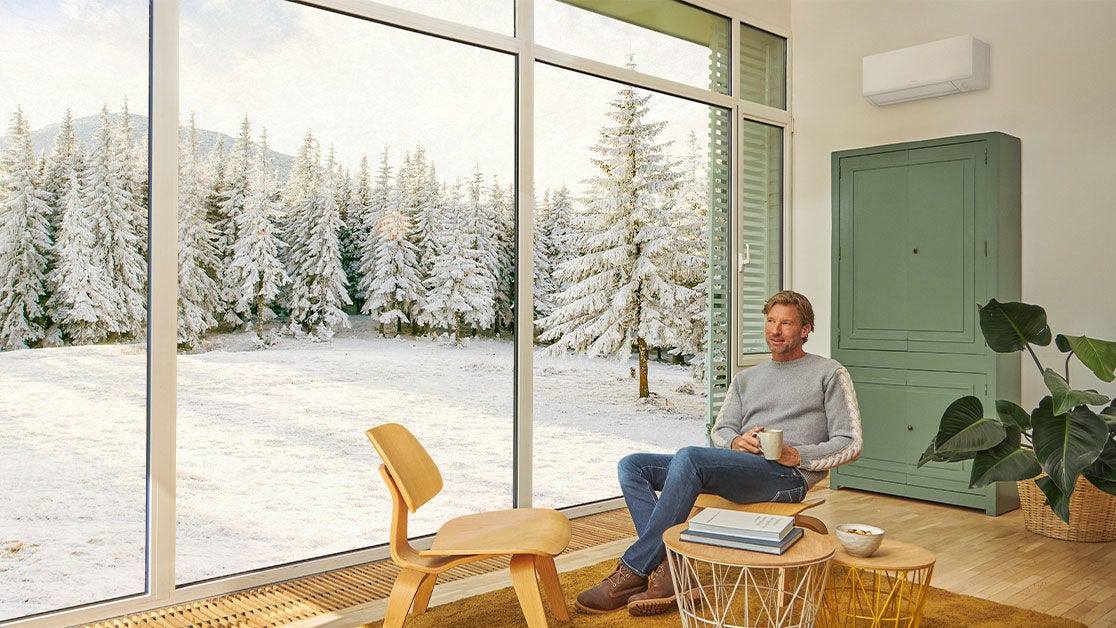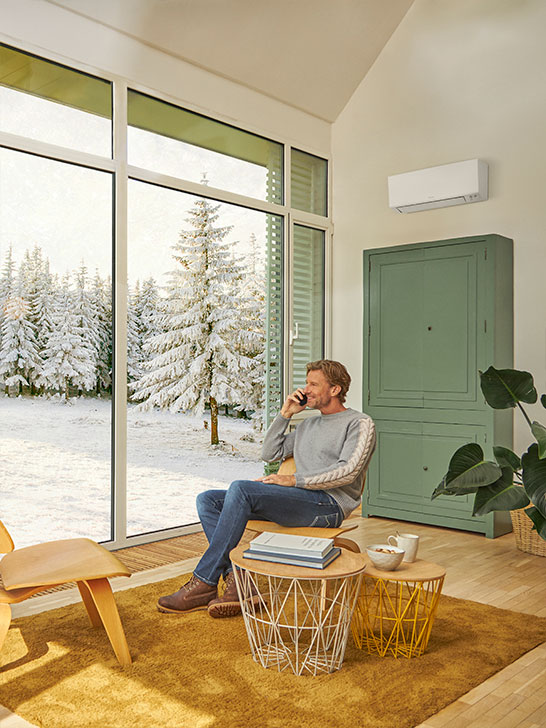Heat pump system heating: Heat your home while spending less
If you're looking for an economical and sustainable alternative to heat your home, heat pump systems offer a unique opportunity to lower your energy bills.

Winter is on the way: temperatures fall, and gas and electricity bills rise. In this context, more and more people are seeking sustainable energy options to get the same (or more) energy for less cost. Heat pump heating is a promising option to efficiently and cost-effectively keep our homes warm. But beware! It’s not suitable for every home. Here’s everything you need to know.
What does this article cover?
What is heat pump technology?
Heat pump systems are climate-control systems that use a heat pump to extract energy from the outside air and convert it into heat, which can be used for heating, cooling, and domestic hot water. This method takes advantage of the heat present in the air –a renewable and free energy source–, making it a sustainable and economical option.
How do pump systems for heating work?
This system consists of an outdoor unit, an indoor unit, and emitter systems that distribute the heat inside the home.
The outdoor unit is installed on the property's exterior wall and captures heat from the environment. It uses a refrigerant fluid that easily absorbs heat from the outside air. The refrigerant is then carried inside, where the indoor unit transfers the heat to the water, ready for heating and domestic hot water. In summer, this process can be reversed to provide cooling (air conditioning).
Available emitter systems
Once the heat is transferred inside the home, it is distributed through various emitter systems, each with its own characteristics:
Underfloor heating: This system is ideal for distributing heat evenly across the entire floor area. It consists of a network of pipes installed under the floor, which hot water circulates through. It is especially efficient because it uses lower water temperatures to heat the space, maximising the heat pump system’s performance.
Fan coils: These compact units can heat or cool a room quickly and effectively. They work by blowing air across a coil containing hot or cold water, as required. They are ideal for climates where both heating and cooling are required.
Low-temperature radiators: These radiators are designed to work efficiently with heat pump systems, as they operate at lower temperatures than conventional radiators. They are a practical option for those wishing to modernise their heating system without major renovations.


Benefits of heat pump system heating
Heat pump heating stands out not only for its advanced technology and environmental benefits, but also for the financial savings it offers in the long term. When considering a heat pump system, it’s important to understand how this initial investment can result in significant, lasting savings.
Superior energy efficiency: With efficiencies ranging from 300% to 400%, heat pump systems redefine energy efficiency in the home. This means that the system can generate up to 4 kW of heat for every kW of electricity used. Compared to traditional boilers, which have much lower efficiencies, heat pump systems use a fraction of the electrical energy to produce the same amount of heat, resulting in an immediate saving in energy consumption.
Long-term financial savings: One of the most attractive aspects of heat pump systems is that 75% of the energy they use comes from the air for free. In practical terms, this translates into a considerable reduction in energy bills, as the system is less dependent on electricity or fossil fuels. Over the years, savings can greatly surpass the initial investment, offering users increased financial stability and shielding them from energy price fluctuations.
Financial and environmental sustainability: Heat pump systems not only lower energy costs but also reduce reliance on fossil fuels, helping to decarbonise the home. This sustainable approach benefits the environment while also shielding users from future carbon taxes or regulations, further consolidating long-term savings.
These are just some of the most notable benefits of heat pump systems for heating, but there are many more.
Limitations and requirements for installing heat pump systems for heating
Although heat pump systems offer many advantages, they aren’t suitable for every home. There are certain factors to consider before opting for this system:
Space for the outdoor unit: Adequate space is essential for installing the heat pump’s outdoor unit. This space should allow good air circulation and be sheltered from elements that might obstruct its operation.
Insulation quality: To maximise the efficiency of heat pump systems, homes need good thermal insulation. Poor insulation can result in higher heat losses, reducing the system’s effectiveness.
Climate considerations: Heat pump systems perform best in moderate climates. In regions with extremely cold winters, it may be necessary to have a backup system or supplement the heat pump with other heat sources.
Need for refurbishment: In some cases, installing a heat pump system may require property renovations, especially when choosing underfloor heating.
Now that you understand how a heat pump system works and its benefits, it’s time to consider whether it suits your home. With its potential for energy savings and its contribution to a more sustainable future, heat pump heating is shaping up to be a smart investment for improving your home’s energy efficiency. Make the switch to the climate control of the future and start enjoying its many benefits.

